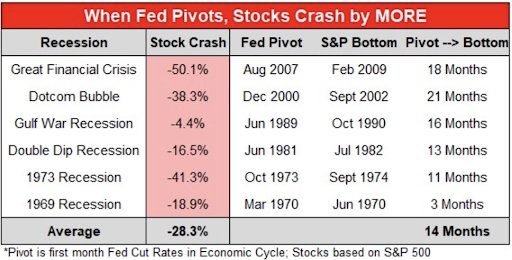A lot of people want to know how to trade stock market volatility, and for good reason…
That’s because volatility is the tail that wags the dog on Wall Street. It’s also a hot topic right now as the beginning of 2022 has been extremely volatile. And you don’t have to trade volatility in stocks or an index to turn a tidy profit…
You can trade it straight up via funds and notes that track the Chicago Board Options Exchange Volatility Index, or VIX, also known as the “fear gauge.” My favorite way to do that is through the Barclays iPath Series B S&P 500 VIX Short-Term Futures ETN (BATS: VXX)…But before we get into how to trade stock market volatility, first we need to understand exactly what it is and how it’s measured.
What Is the VIX?
The VIX is a popular way investors measure the expected amount of volatility in the stock market at any given time to gauge overall market sentiment. It does this by tracking how fast the price of stocks change during trading.
If the price of a stock stays stable — or as close to “stable” an asset can be while on the stock market — it has low volatility. A market or stock that is experiencing high volatility can reach new highs and then come back down quickly — i.e. the movements are erratic with swift rises and dramatic falls.
The VIX usually trades around the 20-point level, which is the score for average volatility — when a stock moves up or down about 1% each trading day. The further above 20, the more volatile in the market. The further below 20, the less volatile the market.
Aside from VXX, you can also trade volatility with these exchange-traded notes and funds:
- iPath Series B S&P 500 VIX Mid-Term Futures ETN (AMEX: VXZ).
- Pro-Shares VIX Short-Term Futures ETF (NYSE: VIXY).
- Pro-Shares VIX Mid-Term Futures ETF (NYSEArca: VIXM).
For a more in-depth dive into volatility, check out some other educational pieces we’ve done:
- What Is the VIX? Understanding Stock Market Volatility
- How to Track Volatility With the VIX
- Understanding the Difference Between Historical and Implied Volatility
How to Trade Stock Market Volatility
Now that we have a better understanding of stock market volatility, let’s discuss how to trade it…
When you learn how to trade volatility the correct way, you’ll realize you don’t have to use it in stocks — you can solely trade volatility by using any of the funds listed above.
In fact, I have an entire strategy based on this called the Round Trip Trading Club. With this strategy, I trade VXX, a liquid and user-friendly ETN listed on the New York Stock Exchange that deals exclusively with volatility.
What I love most about trading volatility is it’s a mean reversion business.
What do I mean by that? When a stock or an asset moves up, it is most likely going to revert back down from where it started, and vice versa — simple mean reversion.
So rather than trending higher like a stock would over the course of time, volatility means revert — allowing traders to go against those moves and profit on both the rise and inevitable fall.
Which is exactly how traders can go long and short the VXX using this strategy — a round trip ride to profits…
Watch the video below to learn more about how to trade stock market volatility using the strategy with so much volume that options trade like water flows.
And as always, send any trading questions to jeff@joyofthetrade.com and stay ahead of the markets, especially these choppy ones, by subscribing to our YouTube channel.
Jeff Zananiri
Head Trader, Joy of the Trade




